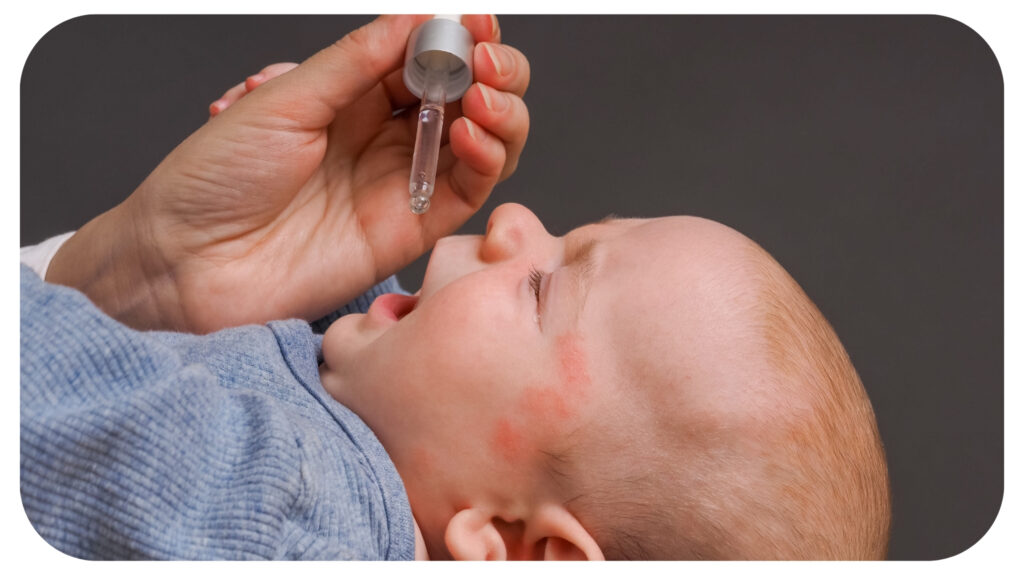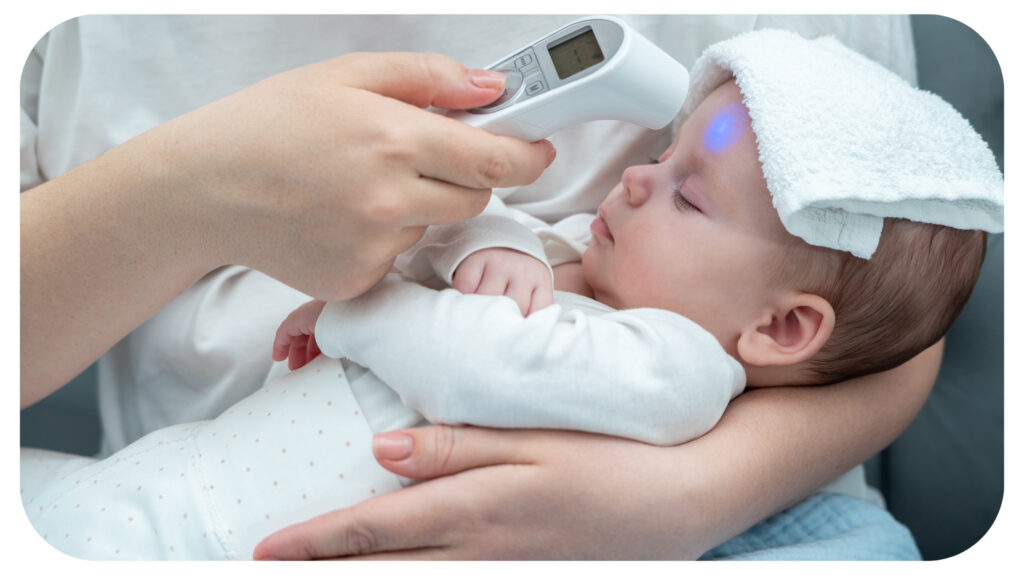Common Cold Or Something More? Decoding Illness Symptoms In Babies
This post was last updated on April 9th, 2024

It’s never fun when your baby is under the weather. One minute, they seem perfectly healthy, and the next, they are fussy, congested, and clearly not feeling well. As a parent, it can be hard to know whether your baby has a common cold or something more serious. Learning to identify and decode your baby’s symptoms can help you figure out when to provide comfort at home or seek medical attention.
This guide will cover some of the most common illness symptoms in babies and tips for distinguishing between mild and more severe cases.
Understanding Common Causes of Illness in Babies
1. Viruses
Viruses are one of the most common causes of illness in babies. The tiny invaders sneak past your little one’s still-developing immune system and set up shop, causing chaos. Some of the most common viral infections in babies include:
- Common cold: Stuffy nose, cough, sneezing, mild fever
- Respiratory syncytial virus (RSV): Wheezing, cough, fever, trouble breathing
- Ear infections: Fever, ear tugging/rubbing, crying, trouble sleeping
- Stomach bug: Vomiting, diarrhea, fever, fussiness
- Hand, foot, and mouth disease: Rash on hands, feet, mouth; sore throat, fever
2. Bacteria
While not as frequent as viruses, bacterial infections can also make babies under six months old very sick. Bacteria like Streptococcus pneumoniae and Haemophilus influenzae type B (Hib) are responsible for pneumonia, meningitis, ear infections, sinus infections, and more. Vaccines help prevent many bacterial illnesses.
3. Allergies
Sniffling, sneezing, coughing—oh my! Babies can start developing allergies as early as four to six months old. Common baby allergy triggers include pet dander, dust mites, pollen, and certain foods like cow’s milk. Allergies tend to cause cold-like symptoms year-round or during certain seasons.
4. Teething
Right around six months old, babies start teething. Swollen gums, drooling, crankiness, biting, and low-grade fevers are par for the course as their first teeth start pushing through. Teething can make babies more uncomfortable than sick.
Key Signs It May Be More Than a Cold
Colds are part of life with a baby. The average little one can get up to six to eight colds in their first year. Most pass within a week or two without issues. However, if your baby has cold symptoms combined with any of the following, it may be time to call the pediatrician:
- Fever over 100.4 degrees Fahrenheit for babies under three months (or over 102 for babies three to six months)
- Difficulty breathing, rapid breathing, wheezing, grunting noises
- Unusual fussiness, lethargy, extreme irritability, or lack of appetite
- Persistent cough, especially if it sounds croupy or your baby is coughing up mucus
- Ear tugging or rubbing
- Uncontrollable crying
- Skin color changes – appearing pale, blue, or flushed

Trust your instincts. You know your child best. If their illness seems severe or they are acting differently than usual, consult your pediatrician right away. Don’t wait to see if they improve.
Decoding Specific Symptoms in Babies
1. Fever
A fever means your baby’s body temperature is elevated. Fevers are one of the most common illness symptoms in babies. Viruses, bacterial infections, and even teething can cause fevers. Use a thermometer to take your baby’s temperature rectally for the most accurate reading. Here’s a temperature guide:
- 100-100.4 F – low-grade fever
- 100.4-102 F – moderate fever
- Over 102 F – high fever (call doctor)
A simple fever under 102 F usually isn’t cause for alarm on its own. Offer more fluids and keep your baby lightly dressed. Call the doctor if the fever persists over 24 hours or is accompanied by other symptoms.
2. Coughing
Coughing helps clear mucus and irritants from the baby’s airways. A nagging cough is typical with colds. However, coughs can also signal infections like croup, RSV, or pneumonia. Call the doctor from centers like just4kidshealth.com if your baby has:
- Rapid, labored breathing
- Wheezing or whistling sound when breathing
- Cough with green, yellow, or red-tinged mucus
- Uncontrollable coughing fits
- Cord-like cough sounding like a seal barking
3. Sneezing
Frequent sneezing is normally a symptom of the common cold. Keep in mind other triggers like allergies or irritation from dust or cigarette smoke can also cause sneezing fits. Sneezing alone without other symptoms is not worrisome. But if sneezing continues for over a week or happens with other signs of illness, touch base with the pediatrician.
4. Stuffy Nose
Stuffy sinuses make it hard for little babies to breathe comfortably and feed properly. The advice ‘let babies breathe’ is crucial with colds. Use saline drops and a nasal aspirator to gently suction mucus from your stuffed-up baby’s nose as needed. Call the doctor if your baby has trouble breathing even after you suction their nose.
5. Decreased Appetite
When sick with a cold, virus, or other illness, babies often lose their appetite. Offer smaller, more frequent feedings and supplement with extra hydration from breast milk or formula. Consult your pediatrician if your baby skips more than two to three feedings or refuses to eat for over 24 hours.
6. Sleeping More
Extra sleep is a baby’s way of healing. Fevers, congestion, coughs, and illness discomfort can all make babies extra sleepy. Allow more rest, and wake your baby for feedings if needed. However, call the doctor if your baby is difficult to rouse, floppy, and shows no interest in feeding.
7. Rashes
Viral infections can sometimes cause a rash in babies. Red spots or bumps on the chest, belly, arms, or legs may develop one to two days after other symptoms start. Rashes are usually mild and go away in a few days. Severe rashes that quickly spread or rashes with bruising, swelling, or discharge need medical evaluation.
8. Ear Infections
Ear infections (otitis media) often complicate colds. Babies tug, rub, or clutch their ear canal and cry from ear infection pain. Sleeping and feeding difficulties are also common. Left untreated, ear infections can result in hearing loss and delays in speech development. Seek medical treatment for suspected ear infections.
9. Dehydration
One of the biggest concerns when babies are sick is dehydration. Vomiting, diarrhea, fever, and poor feeding can all quickly lead to dehydration. Subtle signs in infants include:
- Decreased tears when crying
- Less than six wet diapers per day
- Dry mouth and lips
- Lack of energy, drowsiness
- Weak cry, sunken soft spot on the head
If you spot any dehydration red flags, contact your pediatrician or infant nurse line. Proper hydration is crucial when battling illness.
Handling a Fussy, Uncomfortable Baby
It’s no fun caring for a sick, fussy baby. Cranky behavior when ill is developmentally normal. Here are some tips for coping:
- Stay calm – your baby senses your stress
- Give tummy time, wear your baby, and provide comfort
- Use white noise, music, and rhythmic motions to soothe
- Ensure baby’s environment is cool and comfortable
- Give baths for congestion relief
- Suction mucus carefully from the nose and mouth
- Offer a pacifier or frozen teething toy for pain
- Give gas relief drops for tummy discomfort
- Try infant massage if your baby wants gentle touch
- Take baby for walks outside for fresh air
Remember, growth spurts, teething, developmental leaps, and changes in schedule can also impact your baby’s mood. If fussiness lasts over three hours consistently, discuss causes and solutions with your pediatrician. This, too, shall pass!
When to Make an Appointment with Your Pediatrician
Being vigilant with your baby when they are under the weather is extremely important. As a general rule of thumb, contact your pediatrician or visit urgent care if your baby has:
- A fever over 100.4 F rectally in babies under three months (or over 102 F in babies 3-6 months)
- Difficulty breathing – this needs immediate emergency care
- Extreme fussiness and refusal to eat for over 24 hours
- Persistent vomiting or diarrhea leaving them dehydrated
- Severe ear pain or ear infection symptoms
- A rash that spreads quickly or has bruising or swelling
- Lethargy and lack of interest in surroundings or eating
- Any symptoms you are worried about trusting your gut
When in doubt, reach out. Pediatricians and nurses are there to help assess your baby’s symptoms and determine if they require medical treatment. Don’t hesitate to call, even if it seems minor. Some symptoms that seem mild can indicate larger issues in infants.
What to Ask the Pediatrician About Your Baby’s Illness
Pediatric appointments when your baby is sick can be stressful. Having the right questions to ask prepared ahead of time can help put your mind at ease. Here are some suggested questions:
- What are the most likely causes of my baby’s symptoms?
- Are there any tests you recommend to confirm the diagnosis?
- Is this illness viral or bacterial? How is it treated?
- Are there any signs I should watch for that indicate this is getting worse?
- Should I be concerned about dehydration? How can I keep my baby hydrated?
- Could these symptoms be related to an ear infection?
- Is wheezing/grunting during breathing something to worry about?
- How long can I expect the fever and other symptoms to last?
- Is it okay to give my baby any over-the-counter medications like Tylenol or cough syrup?
- When should I follow up or come back if symptoms don’t improve?
- Is there anything I should be doing at home to help my baby feel better?
Don’t be afraid to speak up during the appointment if you have additional questions or concerns. Before leaving, confirm the best way to follow up with questions after your visit. Working as a team with your pediatrician will help you get your baby back to health.
Tips for Comforting and Soothing a Sick Baby
Looking after an unhappy, under-the-weather baby is demanding both physically and emotionally. Here are some comforting measures you can take:
- Hold and rock your baby. Skin-to-skin contact and swaying motions are calming.
- Keep noise levels low. Too much stimulation can overwhelm a sick baby.
- Run a humidifier in the baby’s room to loosen congestion.
- Elevate the baby’s head with a pillow when sleeping to ease breathing.
- Give plenty of fluids and offer breast milk or formula often.
- Make sure the baby isn’t overdressed so their body temperature can be properly regulated.
- Give an infant pain reliever or fever reducer if recommended by your pediatrician.
- Try using a nasal aspirator and saline drops to gently suction out mucus.
- Distract with rattles, toys, singing, and reading stories.
- Take a warm bath or shower together so the steam can clear your baby’s nostrils.
- Gently massage your baby’s feet, back, and tummy for comfort.
- Meet all of the baby’s needs right away when they cry so they don’t get worked up.
Your tender loving care helps make your baby feel safe, secure, and loved when they are down and out. Remain calm and patient – the storm will pass. Thriving will be back before you know it!
When to Call the Doctor Post-Illness
As your baby recovers, watch for any signs their illness may not be resolving. Follow up with your pediatrician if your baby:
- Has symptoms persisting longer than 10–14 days without improvement
- Gets ill again shortly after seeming to recover
- Develops new or worsening symptoms
- Stops eating or taking adequate fluids
- Has an uncontrollable cough, wheezing, or breathing difficulty
- Still has a fever, congestion, vomiting, or diarrhea
- Is lethargic, cranky, or behaving differently than usual
- Doesn’t want to play, make eye contact, or interact with you
- Is not sleeping well, or is difficult to console
Don’t take chances with your baby’s health. Trust your intuition – you know your child best. When in doubt, give your pediatrician a call so they can decide if your baby needs to be examined.
The Takeaway – Trust Those Mommy Instincts!
Caring for a sick baby is no easy task. But hopefully this guide gave you a helpful overview of common illness symptoms in babies to watch for. Remember to rely on your maternal instincts if you feel your baby’s sickness seems off. Don’t brush off worrisome signs, assuming it is nothing. Your pediatrician would always rather have you call and be told ‘not to worry’ than overlook something serious. When your baby’s health hangs in the balance, trust your gut and take action. With your love and care, your little one will be back doing their happy dance before you know it!
Recommended For You
Comprehensive Guide to Injectable L-Carnitine in Bodybuilding
Most Inside
Most Inside offers high-quality recommendations and valuable updates to enhance all aspects of your life, providing premium guidance and enriching experiences.




